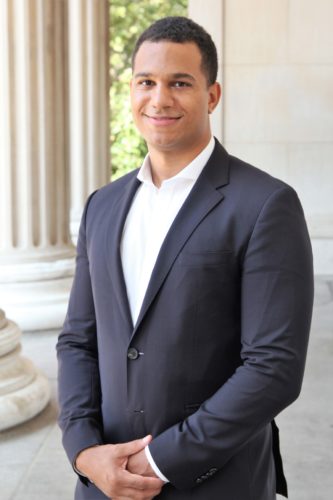Julian Nyarko

While campus is eerily quiet this year, there is some semblance of normalcy—albeit a new one. Julian Nyarko’s fall quarter Contracts is among the few classes held in person on Stanford Law School’s campus during COVID-19 restrictions. Instead of in a lecture hall, it meets outside in the courtyard, everyone masked up. There’s a canopy to shade the 30 students sitting at desks, all appropriately distanced, and IT support to help another 30 students participating remotely via Zoom.
“First-years are really engaged. There have been challenges, but considering the circumstances, it’s going great,” says Nyarko, assistant professor of law, who joined the faculty in January from Columbia Law School, where he was a postdoctoral fellow in the empirical law and economics program.
Nyarko grew up in Germany and received a degree from the University of Hamburg Law School. He was the first in his family to go to college and sought to give back. While studying, he worked as a boxing coach at the Boxing Academy Hamburg, where he offered free lessons to kids with troubled backgrounds. He went on to receive an LLM and a PhD in jurisprudence and social policy from the University of California, Berkeley, and then went to Columbia Law.
Part social scientist, part legal scholar, part empiricist, Nyarko combines quantitative methods, natural language processing, and machine learning in his work. His primary aim is to gain deeper insights into the practice of contract design and drafting under U.S. and international law. “I am particularly interested in studying the empirical realities of contractual evolution. How do new clauses emerge? How are they spreading across contracts? How well does traditional contract theory explain the agreements we see ‘out in the wild’?” he says.
“Julian is an exceptional scholar and teacher whose work is pivotal in the application of data analysis to contract law,” says Jenny Martinez, Richard E. Lang Professor of Law and Dean. “We are thrilled to welcome him to the SLS faculty.”
While his primary scholarly focus is on contracts, Nyarko’s interests are broad and he is finding ready collaborators at Stanford Law. He and Lisa Larrimore Ouellette, professor of law and Justin M. Roach, Jr. Faculty Scholar, are working on a new, textual measure for trademark strength, while he and Jacob Goldin, associate professor of law, are studying judicial polarization across different subject areas.
At the heart of much of Nyarko’s work are natural language processing and computational linguistics, which he says are allowing for faster research. “Developments are happening very quickly. If you’re looking at, say, a large data set of hundreds of thousands of contracts, it’s not feasible to read them all. But we now have tools that allow us to let the computer do all the work. We can train it to read the documents and extract the important information for us within a few hours or less.”
And Nyarko is applying that analysis in novel ways. “A Computational Analysis of Constitutional Polarization” (Cornell Law Review 2019), co-authored with David Pozen and Eric Talley, was the first article to use computational methods to investigate the ideological and partisan structure of constitutional discourse outside the courts. In “A Statistical Test for Legal Interpretation: Theory and Applications” (forthcoming), co-authored with Sarath Sanga, Nyarko develops a new method to conduct legal interpretation, whether it be of statutes, contracts, or other textual sources. His insights have been noticed in the academy too.
His article “Giving the Treaty a Purpose: Comparing the Durability of Treaties and Executive Agreements” (American Journal of International Law 2019), which compared the durability of Senate-approved treaties with that of congressional-executive agreements, was the subject of a dedicated symposium in which leading scholars in international law engaged with Nyarko’s work.
Self-taught in computer programming, a skill Nyarko picked up at Berkeley while researching his PhD, he says Stanford’s excellence in big-data analysis and in computational linguistics was a draw for him. “Stanford has, by far, the best computational linguists, such as Dan Jurafsky and Chris Manning, who are at the forefront of the field and pushing these developments,” he says.
Easy multidiscipline collaboration was another big draw. Already, Nyarko has several papers in the works with Sharad Goel, an assistant professor at Stanford in the Department of Management Science & Engineering in the School of Engineering, and founding director of the Stanford Computational Policy Lab.
“Julian’s the relatively rare person—one who is technically sophisticated, but also knows how to apply his skills to complex policy problems. And he wants to see outcomes improve the world,” says Goel, noting that it helps that Nyarko is also easy to get along with. “As academics, we’re a hard bunch. It’s not that he isn’t opinionated, he is, and we don’t always agree. But he comes with an open mind and he’s thoughtful, so we enjoy the discussion.”
Nyarko describes one working paper “Blind Justice: Algorithmically Masking Race in Charging Decisions” (forthcoming), co-authored with Goel, as particularly timely. “We worked with a district attorney’s office to implement a system that automatically masks racial cues in police reports, in turn mitigating racial bias in prosecutorial charging decisions. The system sparked broad interest in other DA offices around the country, so sharing how it works and discussing the normative issues around its implementation seem particularly important.”
Nyarko and Goel will be teaching a class on bias in algorithmic decision- making in the spring. The class will bring together both engineering students and law students. SL
